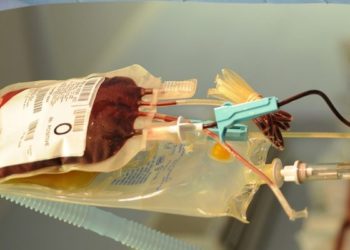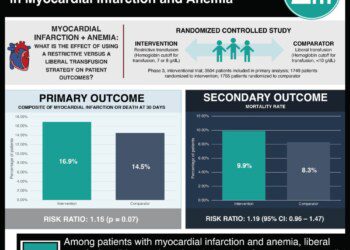Perioperative transfusion in gastric cancer an independent risk factor for recurrence and decreased overall survival
1. Perioperative transfusion for gastric cancer resection was linked to a decrease in recurrence-free survival by 66%.
2. Regardless of timing, number of units, or stage of disease, transfusion was linked to a decrease in recurrence-free survival (RFS) and overall survival (OS) in gastric cancer patients.
Evidence Rating Level: 2 (Good)
Study Rundown: There are conflicting studies on the effectiveness of transfusion in gastric adenocarcinoma (GAC). Some studies cite a survival benefit with certain subsets of gastric cancer patients and other studies show harm instead of benefit. In this study a retrospective database analysis of 7 highly volume centers over 12 years tried to identify the effect of transfusions on recurrence-free survival (RFS) and overall survival (OS) after resection. In addition, the study looked at the effect of transfusions with and without splenectomy as other studies have cited an immunomodulatory component to the recurrence of gastric cancer.
Strengths of the study included the large sample size across multiple centers around the US as well as the long term follow-up analysis for this cohort of gastric cancer patients. Additionally patients were sub-stratified by number of units transfused, stage of disease, timing of transfusion and accounting for confounders like splenectomy. Limitations included the retrospective nature, not accounting for the type of gastric resection or the effect of adjuvant chemotherapy, and variability of patient populations across the different centers that may have all contributed to the perioperative transfusion rate.
Click to read the study in the Journal of the American College of Surgeons
Relevant Reading: Association of allogeneic blood transfusions and long-term survival of patients with gastric cancer after curative gastrectomy
In-Depth [retrospective cohort]: This study analyzed 965 patients undergoing resection for GAC from the U.S. Gastric Cancer Collaborative, which includes 7 high volume academic centers, over a period from 2000-2012. 765 patients were included who had R0 disease and underwent curative resection. Of these patients there were 168 patients (22%) who received perioperative allogeneic blood transfusions which the threshold was surgeon dependent. The study accounted for the timing of the transfusions, number of units transfused, the stage of disease, post-op complications (most commonly reintubation and reoperation) among others. The primary outcomes were RFS and OS with a median follow-up of 44 months. Secondary outcomes were based on concurrent resection and transfusion with or without splenectomy (65 patients or 9% underwent concurrent splenectomy). Median estimated blood loss was 200mL. Exclusion criteria included metastatic disease, palliative resection, and 30 day post-surgical mortality.
The 168 patients receiving transfusions tended to be sicker with an estimated blood loss (EBL) >250mL, had lower rate of adjuvant chemotherapy (44% vs 56% p=0.01), and had more major complications (34% vs.10%, p<0.001). Median RFS for transfused patients was significantly decreased (13.5 vs. 37.2 months, p<0.001). Among those patients that received adjuvant chemotherapy with transfusion the RFS was also decreased (16.1 vs 27.7 months p=0.01). Most significantly, in patients that had curative Stage I resection with transfusion, RFS was decreased (38.3 vs. median not reached (MNR), p<0.001) showing definite harm to patients. Median OS was significantly decreased as well (18.6 vs. 49.8 months, p<0.001). This effect was seen across all stages for OS (Stage I 38.3 vs MNR, p<0.001; II-III 14.8 vs 33.4 months, p<0.001). Not statistically significant were number of units on RFS (>3 units: 13.5months; 1-2 units: 14.2 months; none: 37.2 months, p<0.001) or OS (>3 units: 16.1 months; 1-2 units: 19.5 months; none: 49.8 months, p<0.001). Patients without transfusion, with transfusion only (T), and with transfusion and splenectomy (T&S) showed an additive effect of the harm of transfusion and splenectomy: RFS (none- 39.3 months; T only- 16.1 months; T&S- 9.4 months, p<0.001); OS (none- 53 months; T only- 20.6 months; T&S- 12.2 months, p<0.001). Based on this large retrospective analysis it is clear that transfusion has some immunosuppressive effect that is associated with decreased RFS and OS independent of other risk factors. As with other indications for transfusion, we must be very judicious in GAC patients.
Image: PD
©2015 2 Minute Medicine, Inc. All rights reserved. No works may be reproduced without expressed written consent from 2 Minute Medicine, Inc. Inquire about licensing here. No article should be construed as medical advice and is not intended as such by the authors or by 2 Minute Medicine, Inc.








